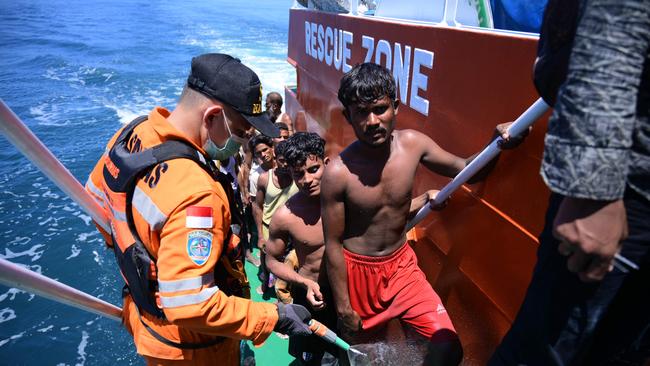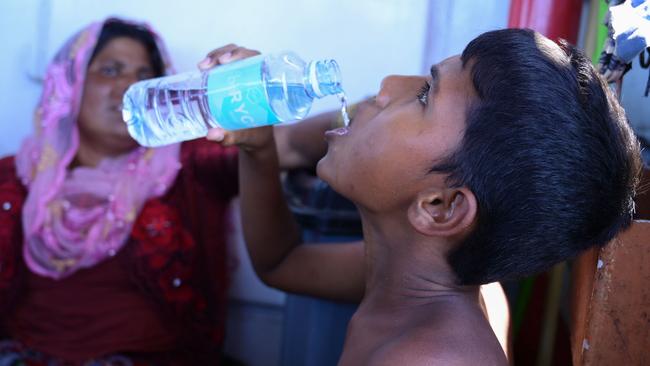Rohingya refugee boat ‘headed for Australia’ capsized off Aceh
One rescued refugee said the boat carrying 150 refugees had hoped to reach Australia but was capsized in heavy swells.

At least 69 Rohingya refugees were rescued on Thursday, with dozens more feared dead, after an asylum boat reportedly headed for Australia capsized in Indian Ocean waters off Aceh province a day earlier.
Local Achenese fishermen first reported the incident Wednesday morning after finding as many as 100 people clinging to the upturned wooden boat some 16 kilometres from Meulaboh city on the West Aceh coast. The fishermen rescued two men and four women at the time, before alerting authorities to the remaining stranded group which had departed from a refugee camp in the region more than three weeks ago.
A video taken by one of the fishermen shows dozens of people standing or clinging to the upturned hull, waving and calling for help.
Banda Aceh Search and Rescue operations chief M. Fathur Rahman said rescue teams had joined local fishermen around midnight on Thursday morning but were unable to locate the stranded group until 9am and by midday had rescued some 50 people.
“We are currently in the process of evacuation, and it’s ongoing. As for the number of casualties, we cannot confirm yet,” he told The Australian.
Rescuers had not recovered any bodies and without a clear idea of how many people were originally on board could not say how many were missing, though any victims would be likely to include women and children who could not swim.
Local media in Aceh on Thursday cited one of the six refugees rescued by fishermen on Wednesday as saying the boat had been headed for Australia after leaving a Rohingya refugee camp around 24 days ago.
Zaned Salim, 34, said there were initially 150 people on board the boat but that 50 had died at sea from starvation.
“We only ate once a day, sometimes not at all,” he said.
Several Indonesian media also quoted Asmiruddin Alnur, a senior local government official in Aceh’s Samatiga subdistrict, as saying the refugees had confessed they were “on their way to Australia and while crossing Aceh waters suddenly they were hit by a wave and their boat capsized”.
But Mr Asmiruddin told The Australian on Thursday he could not say where they were headed because they did not speak English or Indonesian.

Any suggestion the boat was headed for Australia, however, is likely to trigger fresh political debate in Canberra barely a month after 39 Pakistan and Bangladeshi men landed on the remote northern West Australian coastline near Beagle Bay hoping to claim asylum. The men were later flown to an immigration detention camp on Nauru.
Their arrival, the second boat in as many months to reach the Australian mainland, prompted the opposition to accuse the Labor government of not doing enough on border protection and even of incentivising people smugglers through “weak and incompetent” government.
The United Nations’ refugee agency (UNHCR) on Thursday said it was “deeply concerned” over the latest refugee disaster a sea and its representatives were in close communication with the authorities to urgently help the refugees.
“This is an emergency, our priority should be to join hands with the authorities and the local community to save lives, otherwise we are risking a possibility of human tragedy,” a spokesman said.
The UNHCR estimates at least 569 Rohingya died or went missing in South-East Asian waters in 2023, and that close to 4,500 had embarked on deadly sea journeys that year – a significant increase on previous years.
The number reported missing or dead is the highest since 2014, when the total reached 730.
Indonesia is not a party to the 1951 Refugee Convention or its 1967 Protocol but it has been hosting close to 14,000 refugees, mostly from Afghanistan, who are all awaiting resettlement to a third country.
More than 700,000 Rohingya muslims fled over the border to Bangladesh from Myanmar’s western Rakhine State in 2017 as the military undertook what the UN has since described as a “textbook example of ethnic cleansing”.
Some million Rohingya refugees are now living in desperate circumstances in refugee camps in Bangladesh that are rife with violent crime, including human trafficking.
As Indonesia’s only Islamic sharia province, Aceh used to be one of the few places that welcomed Rohingya people, but lack of resources has soured relations between the local population and Rohingya people.
Around 2,000 Rohingya reached Indonesia since last October according to the UNHCR, the biggest influx in eight years. But Aceh, one of the country’s poorest provinces, has struggled to accommodate the refugees, leading to tensions with the local communities and protests by university students calling for their deportation.
Atika Paraswaty from SUAKA, a civil society group working on refugee rights, blamed social media misinformation for the fact many local fishermen were now reluctant to help stranded refugees at sea for fear of prosecution.
“SUAKA urges all relevant parties to ensure protection for fishermen who participate in helping the refugees solely for humanitarian reasons. We also urge the police and authorities not to excessively interrogate, intimidate, or make them suspects,” she said on Thursday.
Ms Paraswaty urged authorities to quickly establish shelters to avoid any further clashes with local communities and ensure the quick delivery of emergency humanitarian assistance to the refugees.


